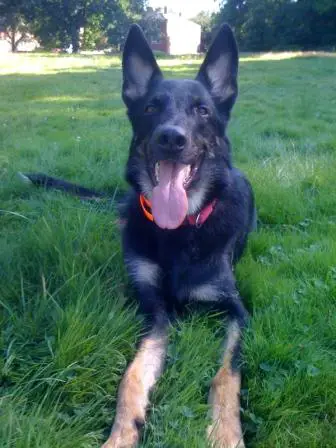After our one and only dog training class in public this year (over Thanksgiving), Amy from GoPetFriendly.com, pet travel made easy, asked an important question: “As long as we can navigate our daily lives without outbursts, I don’t really need to push [Buster’s] boundaries. Have I just lost my motivation or gotten lazy? Have you ever felt the same way about Lilly?”
I thought about answering her comment there, but it’s a big enough topic to warrant a full post.
The simple answer is … YES!
When I shared this sense of reaching a dog training plateau years ago with our behaviorist, she pointed out that Lilly had made amazing strides, and she wondered why on earth I thought we’d reached our final behavioral destination.
If we’d journeyed from X to Y, why did I think Lilly could not go from Y to Z?
Her insights inspired me … a bit … for a while.
But indeed, at now 7 1/ 2 years of age with our dreams of competitive success long gone, Lilly is very much a functioning adult dog.
Yes, she still hides at times. Yes, she still snarks at other dogs at times. Yes, she enjoys learning new things and the connection that comes from training with me.
BUT, it really is nice to have a dog who — on most days at home — is perfectly content and happy … as dog trainer and author Susanne Clothier recently explained in a post called Reality Check.
Why then would I take her places or ask her to take on new challenges?
It’s an important and valid question.
I suspect that we’ll do less of that as time goes on.

Granted, Amy’s Buster is required to function in a much more complex world due to his travel schedule and the demands of the road. [I got the chance to hike with Buster a while back. Lilly stayed at home since neither dog is keen on other dogs, especially on leash.]
Someday, when things settle down, we would like to travel a bit with Lilly, and she’ll need certain skill sets for that. We’ll just have to see where we are when that time comes.
For now, however, Lilly is pretty happy:
- Being at home
- Playing fetch with anyone will throw the ball or stick
- Taking walks and hikes
- Running errands with me in our smallish hometown
- Playing with select dog friends, who are willing to put up with her poor social skills, at home
When I meet people who don’t know about the blog, I often joke that our story is one of failure … since (so far) we haven’t reached our biggest or original goals.
I don’t mean that to sound as pathetic as it might. I simply mean that Lilly and I are where we are in our journey together, and 99% of the time … I accept that.
[OK. 99% is probably generous … let’s say more than 1/2 the time I accept that I have not and perhaps will NOT reach my goals, but that doesn’t mean Lilly isn’t 100% awesome right now.]
If Lilly is happy, then I’m happy. I try (more than I used to) to make decisions on that basis … even though our journey is not at all what I hoped or expected.
If you’ve never seen the video clip, I recommend the story I told after we won the Best Dog Blog Award in 2010. I’m about 7 – 7 1/2 minutes in. You can slide the progress dot over.



Thanks for sharing. This reminds me a lot of working with my dog Meatloaf…
This is such a touching post, Roxanne. And thank you for the links.
When we enter a relationship with a dog, we’re constantly balancing our desire to make the most of her capabilities while accepting her as she is.
I’m facing similar questions with Honey. I hope I can develop the same wisdom you’ve earned with Lilly.
I find that a lot of what you’re saying could actually apply to most skills people try to learn (including me, LOL). Like, it’s easy to get motivated to learn the most important areas of how to do something, like how to use a particular software program or how to speak the basics of a language, etc. But once you’ve gotten to a point where it feels like you can get by with what you know, a huge part of the driving motivation disappears (because the lack of knowledge isn’t affecting day-to-day life so strongly).
The only way I’ve been able to go forward after hitting that kind of plateau is to find enjoyment in the activity itself, without focusing too much on how useful it is / how good I want to be.
Great info and insights! My white shepherd has never been interested in other dogs. She is a bit fearful of them but, when her little brother is around, she thinks it’s her job to protect him. We are working on this as she is only 8 months old and perfect in every other way. My trainer commented about her disinterest in other dogs and said I am lucky. What if she was aggressive? It’s all a journey of understanding and acceptance.
Awe, Rox – thanks for the post! It’s funny because I’d gone back to that comment a few times to see if you’d replied, but this is SO MUCH better!
It doesn’t surprise me that your behaviorist would be interested in continuing to strive for improvement in a dog. I think that reflects a drive that makes them so good at what they do. It’s the owner’s responsibility to decide if the goal they’re working toward is worth pursuing. For me, getting Buster to a point that he can comfortably navigate our normal daily life (given, that’s a bit more complicated than the average dog’s life) is all I care about. Pushing him to work through situations that we don’t face regularly in real life seems like it’s more about my ego than what’s best for Buster. Yes, it would be wonderful to have a bomb-proof dog, but I don’t. I have Buster, and no amount of striving and pushing on my part is going to turn him into a bomb-proof dog – it’s just not who he is. And I can accept that. Perhaps Buster’s lesson to me has something to do with the disillusion of perfectionism. 🙂
I’m sorry, Amy. I should have posted an answer to your comment that I’d planned a blog post to answer instead. Buster is an awesome, awesome boy, and your recent visit to the Herd proves that he has come a long way. Look at us learning … me about failure, you about becoming a recovering perfectionist … welcome to the club.